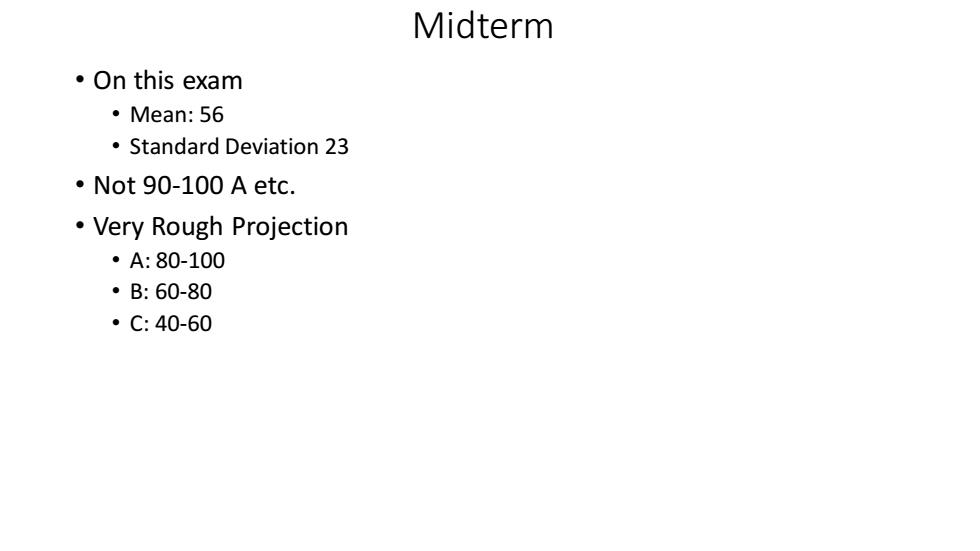
Midterm ·On this exam ·Mean:56 Standard Deviation 23 ·Not90-100Aetc. Very Rough Projection ·A:80-100 ·B:60-80 ·C:40-60
Midterm • On this exam • Mean: 56 • Standard Deviation 23 • Not 90-100 A etc. • Very Rough Projection • A: 80-100 • B: 60-80 • C: 40-60
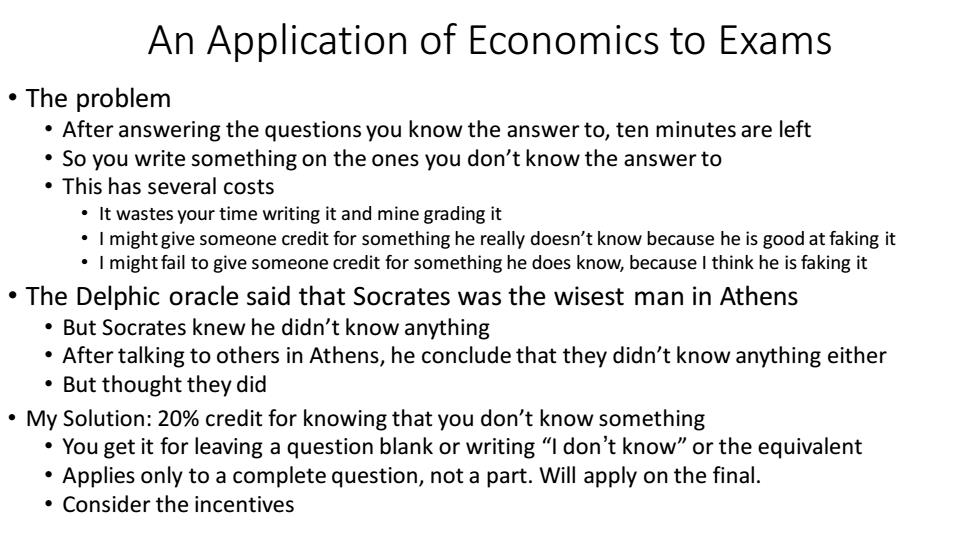
An Application of Economics to Exams 。The problem After answering the questions you know the answer to,ten minutes are left So you write something on the ones you don't know the answer to This has several costs It wastes your time writing it and mine grading it I might give someone credit for something he really doesn't know because he is good at faking it I might fail to give someone credit for something he does know,because I think he is faking it The Delphic oracle said that Socrates was the wisest man in Athens But Socrates knew he didn't know anything After talking to others in Athens,he conclude that they didn't know anything either ·But thought they did My Solution:20%credit for knowing that you don't know something You get it for leaving a question blank or writing "I don't know"or the equivalent Applies only to a complete question,not a part.Will apply on the final. Consider the incentives
An Application of Economics to Exams • The problem • After answering the questions you know the answer to, ten minutes are left • So you write something on the ones you don’t know the answer to • This has several costs • It wastes your time writing it and mine grading it • I might give someone credit for something he really doesn’t know because he is good at faking it • I might fail to give someone credit for something he does know, because I think he is faking it • The Delphic oracle said that Socrates was the wisest man in Athens • But Socrates knew he didn’t know anything • After talking to others in Athens, he conclude that they didn’t know anything either • But thought they did • My Solution: 20% credit for knowing that you don’t know something • You get it for leaving a question blank or writing “I don’t know” or the equivalent • Applies only to a complete question, not a part. Will apply on the final. • Consider the incentives

Some General Issues on this Exam Talking about the subject instead of answering the question. When I cross stuff out it doesn't mean it is wrong It means it is irrelevant to the question Confusing what is efficient with what will happen or what is in the individual's interest An important mistake,since a central problem Is how to prevent situations where what happens is not efficient For example problem I B The airline does not control noise Which is not the efficient solution But is the solution that results from each party acting in his own interest
Some General Issues on this Exam • Talking about the subject instead of answering the question. • When I cross stuff out it doesn’t mean it is wrong • It means it is irrelevant to the question • Confusing what is efficient with what will happen or what is in the individual’s interest • An important mistake, since a central problem • Is how to prevent situations where what happens is not efficient • For example problem I B • The airline does not control noise • Which is not the efficient solution • But is the solution that results from each party acting in his own interest
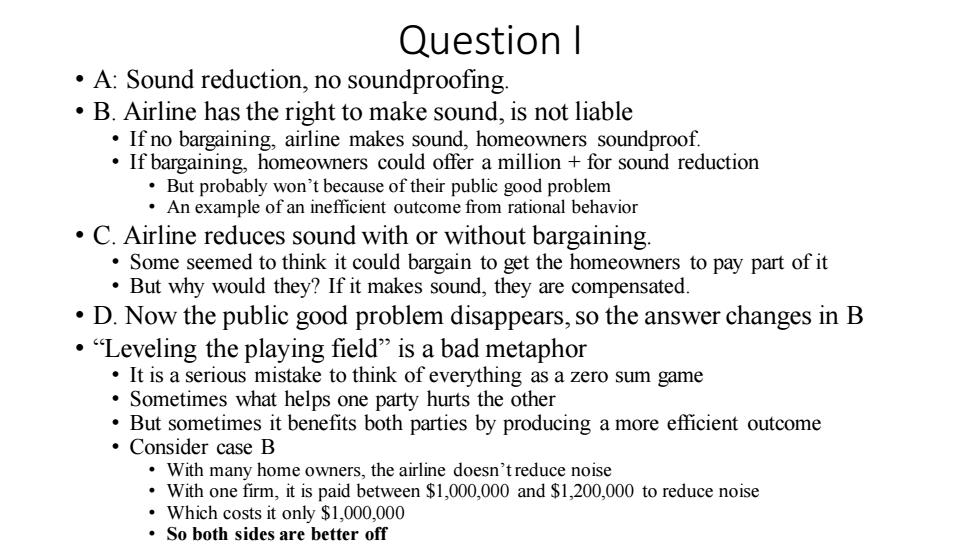
Question I A:Sound reduction,no soundproofing. B.Airline has the right to make sound,is not liable If no bargaining,airline makes sound,homeowners soundproof. If bargaining,homeowners could offer a million for sound reduction But probably won't because of their public good problem An example of an inefficient outcome from rational behavior C.Airline reduces sound with or without bargaining. Some seemed to think it could bargain to get the homeowners to pay part of it But why would they?If it makes sound,they are compensated. D.Now the public good problem disappears,so the answer changes in B ."Leveling the playing field"is a bad metaphor It is a serious mistake to think of everything as a zero sum game Sometimes what helps one party hurts the other But sometimes it benefits both parties by producing a more efficient outcome ·Consider case B With many home owners,the airline doesn'treduce noise With one firm,it is paid between $1,000,000 and $1,200,000 to reduce noise Which costs it only $1,000,000 So both sides are better off
Question I • A: Sound reduction, no soundproofing. • B. Airline has the right to make sound, is not liable • If no bargaining, airline makes sound, homeowners soundproof. • If bargaining, homeowners could offer a million + for sound reduction • But probably won’t because of their public good problem • An example of an inefficient outcome from rational behavior • C. Airline reduces sound with or without bargaining. • Some seemed to think it could bargain to get the homeowners to pay part of it • But why would they? If it makes sound, they are compensated. • D. Now the public good problem disappears, so the answer changes in B • “Leveling the playing field” is a bad metaphor • It is a serious mistake to think of everything as a zero sum game • Sometimes what helps one party hurts the other • But sometimes it benefits both parties by producing a more efficient outcome • Consider case B • With many home owners, the airline doesn’t reduce noise • With one firm, it is paid between $1,000,000 and $1,200,000 to reduce noise • Which costs it only $1,000,000 • So both sides are better off

If Everything is Zero Sum Whatever helps me must hurt you So all disagreements are about Which of us gets the goodies Examples of the mistake If China gets richer,we are less competitive,which is bad If the rich get richer the poor must get poorer All political disagreements are about which side you are on rich or poor,black or white,Americans or foreigners So Republicans and Democrats are enemies And all is fair in love and war Husbands and wives are enemies too Consider implications of the belief In settlement negotiations In trade negotiations In interpersonal relations A very dangerous mistake
If Everything is Zero Sum • Whatever helps me must hurt you • So all disagreements are about • Which of us gets the goodies • Examples of the mistake • If China gets richer, we are less competitive, which is bad • If the rich get richer the poor must get poorer • All political disagreements are about which side you are on • rich or poor, black or white, Americans or foreigners • So Republicans and Democrats are enemies • And all is fair in love and war • Husbands and wives are enemies too • Consider implications of the belief • In settlement negotiations • In trade negotiations • In interpersonal relations • A very dangerous mistake

Question II Rationality:Individuals tend to take the action that best achieves their objectives Could add the Posner conjecture as one approach And figuring out the consequences of law as another ·But don't have to ."Legal Issues that it helps to understand"requires That it is a legal issue. ·“Why people rob banks'”is not a legal issue How law should prevent bank robberies is That economics tells something we didn't already know We already knew why people rob banks Because that's where the money is But we might not know the risk of giving life imprisonment for armed robbery Or the argument in favor of permitting concealed carry What matters is not if the victim usually defeats the mugger,but If it happens often enough to make mugging unprofitable
Question II • Rationality: Individuals tend to take the action that best achieves their objectives • Could add the Posner conjecture as one approach • And figuring out the consequences of law as another • But don’t have to • “Legal Issues that it helps to understand” requires • That it is a legal issue. • “Why people rob banks” is not a legal issue • How law should prevent bank robberies is • That economics tells something we didn’t already know • We already knew why people rob banks • Because that’s where the money is • But we might not know the risk of giving life imprisonment for armed robbery • Or the argument in favor of permitting concealed carry • What matters is not if the victim usually defeats the mugger, but • If it happens often enough to make mugging unprofitable
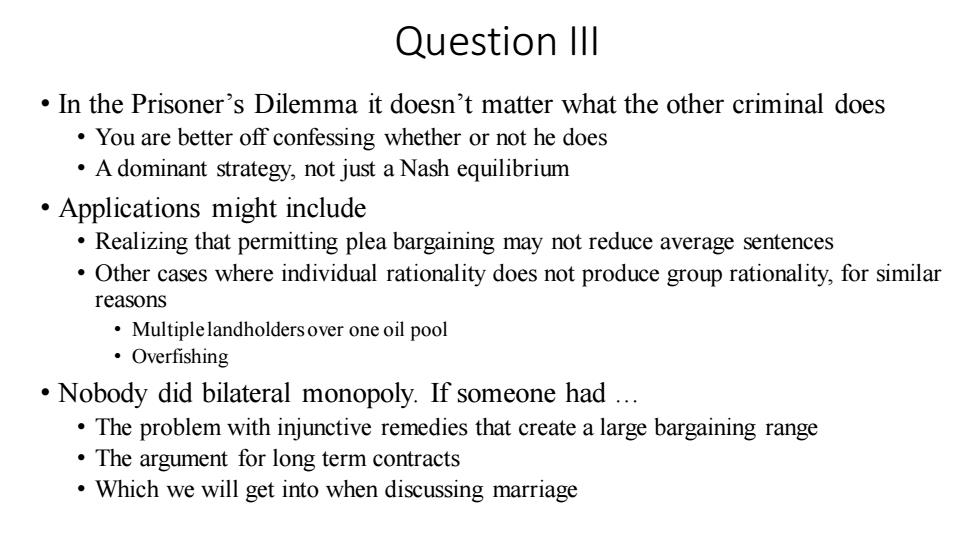
Question III In the Prisoner's Dilemma it doesn't matter what the other criminal does You are better off confessing whether or not he does A dominant strategy,not just a Nash equilibrium Applications might include Realizing that permitting plea bargaining may not reduce average sentences Other cases where individual rationality does not produce group rationality,for similar reasons Multiplelandholdersover one oil pool ·Overfishing Nobody did bilateral monopoly.If someone had... The problem with injunctive remedies that create a large bargaining range The argument for long term contracts Which we will get into when discussing marriage
Question III • In the Prisoner’s Dilemma it doesn’t matter what the other criminal does • You are better off confessing whether or not he does • A dominant strategy, not just a Nash equilibrium • Applications might include • Realizing that permitting plea bargaining may not reduce average sentences • Other cases where individual rationality does not produce group rationality, for similar reasons • Multiple landholders over one oil pool • Overfishing • Nobody did bilateral monopoly. If someone had … • The problem with injunctive remedies that create a large bargaining range • The argument for long term contracts • Which we will get into when discussing marriage
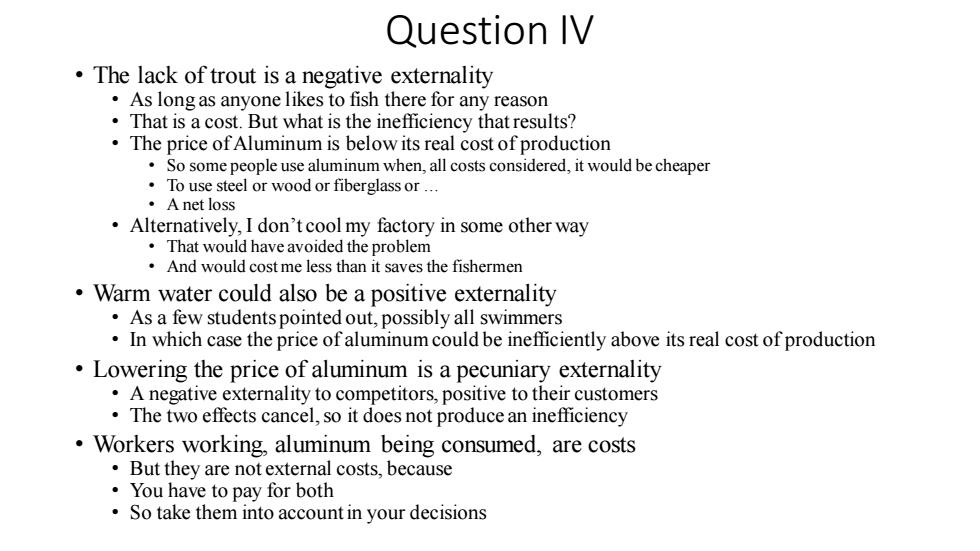
Question IV The lack of trout is a negative externality As long as anyone likes to fish there for any reason That is a cost.But what is the inefficiency that results? The price of Aluminum is below its real cost of production So some people use aluminum when,all costs considered,it would be cheaper To use steel or wood or fiberglass or... ·A net loss Alternatively,I don't cool my factory in some other way That would have avoided the problem And would cost me less than it saves the fishermen Warm water could also be a positive externality As a few students pointed out,possibly all swimmers In which case the price ofaluminum could be inefficiently above its real cost of production Lowering the price of aluminum is a pecuniary externality A negative externality to competitors,positive to their customers The two effects cancel,so it does not produce an inefficiency Workers working,aluminum being consumed,are costs But they are not external costs,because You have to pay for both So take them into account in your decisions
Question IV • The lack of trout is a negative externality • As long as anyone likes to fish there for any reason • That is a cost. But what is the inefficiency that results? • The price of Aluminum is below its real cost of production • So some people use aluminum when, all costs considered, it would be cheaper • To use steel or wood or fiberglass or … • A net loss • Alternatively, I don’t cool my factory in some other way • That would have avoided the problem • And would cost me less than it saves the fishermen • Warm water could also be a positive externality • As a few students pointed out, possibly all swimmers • In which case the price of aluminum could be inefficiently above its real cost of production • Lowering the price of aluminum is a pecuniary externality • A negative externality to competitors, positive to their customers • The two effects cancel, so it does not produce an inefficiency • Workers working, aluminum being consumed, are costs • But they are not external costs, because • You have to pay for both • So take them into account in your decisions

Question V Risk aversion is not about present vs future but about you being rich or poor Risk preferring doesn't mean you like risk That you would choose to flip a coin,heads you lose a thousand dollar,tails you don't. Only that you like a coin flip where heads you lose a thousand,tails you win a thousand. What do risk averse,risk neutral,and risk preferring mean ·n money ·n life ·in grades Risk aversion in money is due to declining marginal utility of income And that does not imply declining marginal utility of years or grades Ex ante ex post question:Deaths vs Dents One major problem with ex post is having to impose large punishments If the only result is denting,that is unnecessary So a pure ex post system makes much more sense than if accidents kill
Question V • Risk aversion is not about present vs future but about you being rich or poor • Risk preferring doesn’t mean you like risk • That you would choose to flip a coin, heads you lose a thousand dollar, tails you don’t. • Only that you like a coin flip where heads you lose a thousand, tails you win a thousand. • What do risk averse, risk neutral, and risk preferring mean • In money • In life • In grades • Risk aversion in money is due to declining marginal utility of income • And that does not imply declining marginal utility of years or grades • Ex ante ex post question: Deaths vs Dents • One major problem with ex post is having to impose large punishments • If the only result is denting, that is unnecessary • So a pure ex post system makes much more sense than if accidents kill
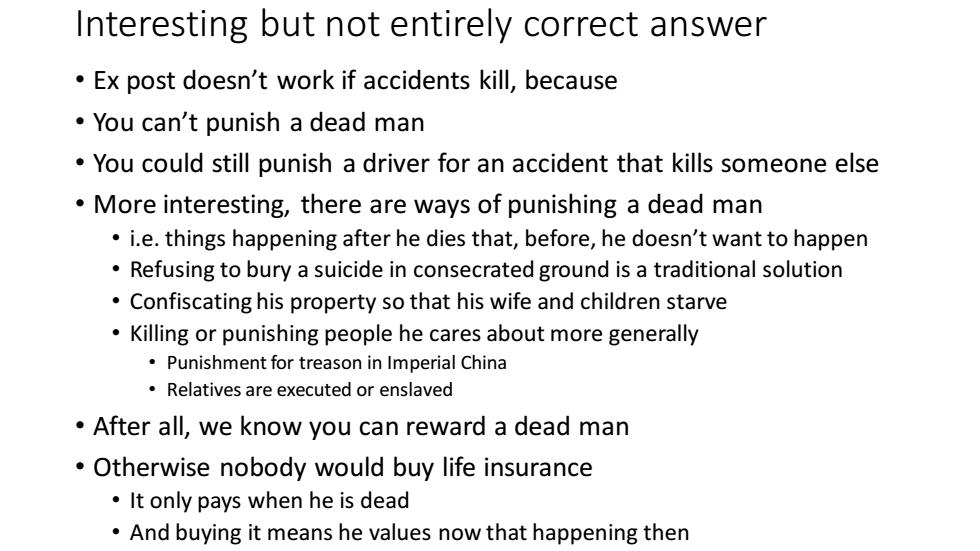
Interesting but not entirely correct answer Ex post doesn't work if accidents kill,because You can't punish a dead man You could still punish a driver for an accident that kills someone else More interesting,there are ways of punishing a dead man i.e.things happening after he dies that,before,he doesn't want to happen Refusing to bury a suicide in consecrated ground is a traditional solution Confiscating his property so that his wife and children starve Killing or punishing people he cares about more generally Punishment for treason in Imperial China Relatives are executed or enslaved After all,we know you can reward a dead man Otherwise nobody would buy life insurance It only pays when he is dead And buying it means he values now that happening then
Interesting but not entirely correct answer • Ex post doesn’t work if accidents kill, because • You can’t punish a dead man • You could still punish a driver for an accident that kills someone else • More interesting, there are ways of punishing a dead man • i.e. things happening after he dies that, before, he doesn’t want to happen • Refusing to bury a suicide in consecrated ground is a traditional solution • Confiscating his property so that his wife and children starve • Killing or punishing people he cares about more generally • Punishment for treason in Imperial China • Relatives are executed or enslaved • After all, we know you can reward a dead man • Otherwise nobody would buy life insurance • It only pays when he is dead • And buying it means he values now that happening then